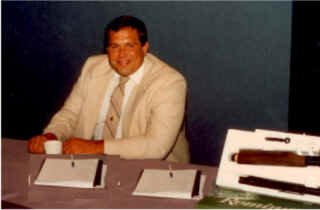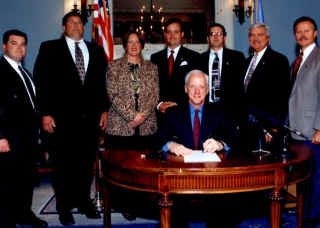| Your
Guide To Oklahoma County Oklahoma Genealogy Part of the OKGenWeb Project | |||
| Updated: 03 Sep 2025 | |||
|
| |||
|
|
Surname Index |
|
Lonnie Wright Memorial
Lonnie Wright, Director of the Oklahoma Bureau of Narcotic, died April 27, 2006 of a massive heart attack suffered at his home. He was 51 years old and is survived by his wife, Rita, his daughter, Rachel, his mother, Wilma, and a brother, Mark. His father, Gene, and a beloved son, Wesley, preceded him in death.
In 1977 Wright joined the Oklahoma Bureau of Narcotics and Dangerous Drugs Control, a time when the agency was in its infancy with only seven agents, statewide. He quickly distinguished himself among his contemporaries by his intelligence, courage, and ability. He was particularly adept in developing and successfully bringing to fruition complex conspiratorial cases against international air smugglers and other organized criminal groups that were prosecuted in state and federal courts throughout the southern and southwestern United States. In 1981 he was promoted to Agent-in-Charge of the Oklahoma City Enforcement Division. In 1988, Wright was promoted to the position of Chief Agent of the Bureau's Intelligence Division. In that capacity, he successfully provided oversight and direction to the establishing of the Statewide Intelligence Network Project and Gang Enforcement Project. Additionally, Wright helped pioneer the highly successful Wire Intercept Project designed to identify and target some of the largest drug organizations operating in this part of the United States. Wright was named Director of OBN in 2003. In the fall of 2003, Director Wright helped draft HB 2176, a measure regulating pseudo-ephedrine that drastically reduced methamphetamine laboratories in the State of Oklahoma. It has become model legislation for the entire country and has been adopted by numerous other states. A very private man, Director Wright was most comfortable in the company of his family and old friends. Yet, he was by nature an affable man, easy to approach, generous in his judgment of others, and tolerant of differences of opinions. He enjoyed open discussions and rarely engaged in heated arguments. He had many friends and few enemies as a result. The State of Oklahoma knew him only briefly as a public man and administrator. Those who knew him well were not surprised at his early achievements. Indeed, they expected them. His death came too early to test the fullness of the considerable abilities of this honorable man. Friends may pay their respects at Ford Funeral Service from 8am to 8pm Sunday or at the State Capital Rotunda, first floor, from 7am to 11am Monday. Funeral Services will be conducted by Ford Funeral Service at 2pm Monday at St. Monica Catholic Church. The Oklahoma Senate Monday, May 1 • The Senate met briefly Monday before adjourning in time for members to attend the funeral of Lonnie Wright, Director of the Oklahoma Bureau of Narcotics and Dangerous Drugs Control. The Senate approved the following measure on Monday: Midwest City Sun Lonnie Wright, Director of the Oklahoma Bureau of Narcotic, died April 27, 2006 of a massive heart attack suffered at his home. He was 51 years old and is survived by his wife, Rita; his daughter, Rachel; his mother, Wilma; and a brother, Mark. His father, Gene; and a beloved son, Wesley, preceded him in death. Wright was a much-recruited All-State athlete at Choctaw High School. Upon graduation, he accepted a full football scholarship from the University of Oklahoma. He graduated from the University in 1976 with a Bachelor of Arts degree in political science and law enforcement administration. He was proud to have played on two National Championship teams. In 1977, Wright joined the Oklahoma Bureau of Narcotics and Dangerous Drugs Control, a time when the agency was in its infancy with only seven agents, statewide. He quickly distinguished himself among his contemporaries by his intelligence, courage and ability. He was particularly adept in developing and successfully bringing to fruition complex conspiratorial cases against international air smugglers and other organized criminal groups that were prosecuted in state and federal courts throughout the southern and southwestern United States. In 1981, he was promoted to Agent-in-Charge of the Oklahoma City Enforcement Division. In 1988, Wright was promoted to the position of Chief Agent of the Bureau’s Intelligence Division. In that capacity, he successfully provided oversight and direction to the establishing of the Statewide Intelligence Network Project and Gang Enforcement Project. Additionally, Wright helped pioneer the highly successful Wire Intercept Project designed to identify and target some of the largest drug organizations operating in this part of the United States. Wright was named Director of OBN in 2003. In the fall of 2003, Director Wright helped draft HB 2176, a measure regulating pseudoephedrine that drastically reduced methamphetamine laboratories in the State of Oklahoma. It has become model legislation for the entire country and has been adopted by numerous other states. A very private man, Director Wright was most comfortable in the company of his family and old friends. Yet, he was by nature an affable man, easy to approach, generous in his judgment of others, and tolerant of differences of opinions. He enjoyed open discussions and rarely engaged in heated arguments. He had many friends and few enemies as a result. The State of Oklahoma knew him only briefly as a public man and administrator. Those who knew him well were not surprised at his early achievements. Indeed, they expected them. Friends paid their respects at Ford Funeral Service from 8 a.m. to 8 p.m. Saturday and Sunday and at the State Capital Rotunda, first floor, from 7 a.m. to 11 a.m. Monday. Funeral Services were conducted by Ford Funeral Service 2 p.m. Monday at St. Monica Catholic Church. Memorial donations may be made to the Oklahoma City Indian Clinic, 4913 W. Reno, Oklahoma City, OK 73127.
Daily Oklahoman, The The state’s landmark antimethamphetamine law should include the name of the narcotics bureau chief who helped write the measure, the governor said Sunday. Wright had served as director of the state Bureau of Narcotics and Dangerous Drugs Control.
Daily Oklahoman, The Drug chief played role in meth law Tulsa World Lonnie Wright, a longtime narcotics agent who was director of the Oklahoma Bureau of Narcotics and Dangerous Drugs Control for the past three years, died Thursday. Wright came to the agency in 1977. He retired for a year and went to work for the District Attorneys Council but eventually returned to the drug agency, [Mark Woodward] said. Tulsa World Stronger regulation of pseudoephedrine, which is found in over- the-counter cold medications, will meet with loud objections from pharmaceutical lobbyists, said Lonnie G. Wright, director of the Oklahoma Bureau of Narcotics and Dangerous Drugs Control. In 2002, the city of Tulsa reported 178 meth labs, up from 61 in 1996, [Tim Harris] said. Harris, who called methamphetamine a public health epidemic, said 74 percent of children who were removed from households where meth was produced tested positive for a controlled dangerous substance in their urine or blood. Sources: good faith fair use of sources stated above Compiled, transcribed and submitted by Marti Graham, Oklahoma County, OKGenWeb Coordinator, November 2007. Information posted for educational purposes for viewers and researchers. The contributor is not related to nor researching any of the above.
I believe in random acts of kindness and I believe in sharing genealogy. If you have copies of
photos, obituaries, wills, biographies, or stories relating to any of these families or other Oklahoma County families, would you consider sending them my way for publication at this site?
|
|
I hope you enjoy searching through our web site, as I've spent
considerable time on it. If you find other information on the web or elsewhere that might be appropriate for this page, please let me know. I'm am particularly interested journals or other records of movement into Oklahoma County, Oklahoma. | ||
| Site authored by Marti Graham, Coordinator Oklahoma County, Oklahoma part of the OKGenWeb Project |
Visitor: Home Page last updated: Wednesday, 03-Sep-2025 02:38:22 UTC This page updated: 03 Sep 2025 |
|
|
Copyright © 1997-2015. NO PART may be reproduced without author's permission. | ||
|
You found this information at //www.okgenweb.net/~okoklaho/obit/wright_lonnie.htm | ||

 Daily Oklahoman
Daily Oklahoman Wright was a much-recruited
All-State athlete at Choctaw High School. Upon graduation he
accepted a full football scholarship from the University of
Oklahoma. He graduated from the University in 1976 with a
Bachelor of Arts degree in Political Science and Law Enforcement
Administration. He was proud to have played on two National
Championship teams.
Wright was a much-recruited
All-State athlete at Choctaw High School. Upon graduation he
accepted a full football scholarship from the University of
Oklahoma. He graduated from the University in 1976 with a
Bachelor of Arts degree in Political Science and Law Enforcement
Administration. He was proud to have played on two National
Championship teams. 


